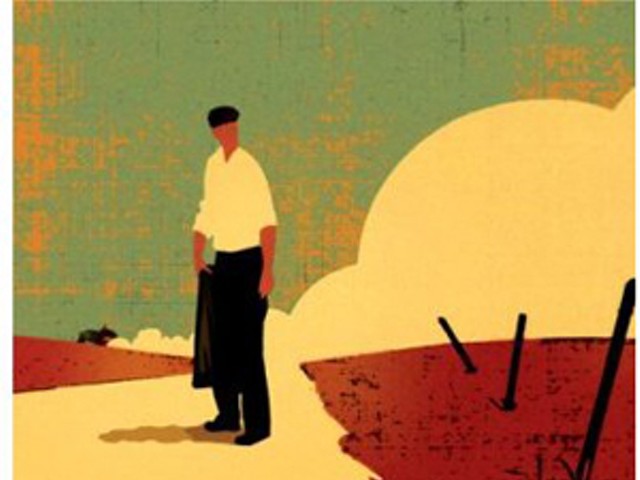"This Land Is Your Land"
Woody Guthrie
Certainly one of our best-known folk songs, many of us learned the words of this rousing tribute to America in elementary school music classes. But little did any of us suspect as kids that the tune was once considered "subversive" and perhaps even the work of a "Commie."
Woody Guthrie — the activist and folk singer who influenced a multitude of musical genres and artists, most notably Bob Dylan and Bruce Springsteen — wrote the song in 1940 as a response to Irving Berlin's "God Bless America." He was virtually "sick" of hearing Kate Smith repeatedly singing it on the radio every night. A Dust Bowl poet and troubadour who had spent the previous decade observing firsthand the spoils and misery of the Great Depression, and whose guitar featured the emblazoned words "This Machine Kills Fascists," Guthrie knew there was much more to this country than the things Berlin celebrated in his somewhat sugar-coated composition. (In fact, Guthrie originally titled his song "God Blessed America for Me.")
The song was considered subversive due to several verses that were censored over the years, probably first during the "Communist threat" hysteria of the '50s, including "There was a big high wall there that tried to stop me/Sign was painted, it said 'Private Property'/But on the backside, it didn't say nothing/That sign was made for you and me" and "Nobody living can ever stop me/As I go walking that freedom highway/Nobody living can ever make me turn back/This land was made for you and me" and finally "In the squares of the city, in the shadow of a steeple/By the relief office, I'd seen my people/As they stood hungry, I stood there asking, 'Is this land made for you and me?" Interestingly and triumphantly, the verses were reinstated at the insistence of Guthrie's friend Pete Seeger (himself blacklisted during the McCarthy era) when he sang the song with Springsteen and others at the Obama Inauguration Celebration at the Lincoln Memorial this past January. Seeger looked positively giddy throughout. And with that in mind, perhaps we should plan to gather together to sing it again on a regular basis, on Wall Street, in front of the AIG building as well as banks all over this country, or anywhere that it needs to be heard during this next year or so, following it up with a rousing rendition of the O'Jays "For the Love of Money." —Bill Holdship
"Brother, Can You Spare a Dime"
E.Y. (Yip) Harburg and Jay Gorney, 1932
His fellow Tin Pan Alley lyricists surely walked by veterans reduced to begging, but Harburg, the most socially conscious of the lot, turned the experience into an anthem in the voice of the beggar himself. Introduced in the musical New Americana, "Brother Can You Spare a Dime" topped the charts as sung by Bing Crosby and has been revived and reinterpreted over and over again. National Public Radio's Susan Stamberg last year sat with composer Rob Kapilow to dissect its brilliance, line by line, minor key to major and back, as it courses from depression to hope to anger. The title alone, Kapilow said, is "the entire history of the Depression in a single phrase." —W. Kim Heron
"Here Comes That Rainbow Again"
Kris Kristofferson
The Grapes of Wrath hit a trifecta of sorts with this piece. Along with the book and movie, it also made our Depression hit parade by serving as an inspiration for this Kris Kristofferson song (released in 1983), which depicts a single scene were two Okie kids on the road go into a restaurant with a penny between them and a waitress, taking pity on them, gives them each a piece of candy. A gruff truck driver notices her giving them a break, and responds by leaving a generous tip. It is a small moment, but it captures the way hard times can bring out the goodness of people. "Ain't it just like a human," sings Kristofferson in a piece as spare as any soup kitchen handout. "Here's comes that rainbow again." —Curt Guyette
"Strange Fruit"
Billie Holiday, 1939
In 1939, the film version of Gone with the Wind swept up white America with nostalgia for the plantations of the Old South. That same year, Billie Holiday introduced a song that etched in acid the reality of the contemporary South. Written by left-activist and New York schoolteacher Abel Meeropol — under the pen name of Lewis Allen — the song brutally cast the body of a lynched black man hanging from a tree as the "strange fruit" of the South. It was only a modest seller, but its impact and notoriety far exceeded actual sales. A defining moment in Holiday's career, the song became part of the crusade for anti-lynching legislation. For black Americans already shoved to the low rungs of America's economic ladder, the Depression wasn't the shock it was for whites, nor did the New Deal (a "strange marriage of Sweden and South Africa" opined one recent scholar) offer as much relief. Holiday's triumph may have been a product of the Depression, but its protest heralded the civil rights movement to come. —WKH






